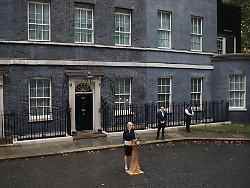Stirring up the formation of a cabinet
Truss wants to lead the country through the “storm” – rival dismissed
09/06/2022, 10:00 p.m
In the UK, the transfer of power is complete. Johnson and his successor Truss completed their appointments with the Queen. Then the new head of government turned to the people. The 47-year-old sets an exclamation point when it comes to the allocation of posts.
Hours after her appointment by the Queen, Britain’s new Prime Minister, Liz Truss, has addressed the country’s citizens and promised to lead Britain through the current ‘storm’ of energy crisis and double-digit inflation. “As strong as the storm is, I know the British people are stronger,” Truss said. In her first speech in front of her office in London’s Downing Street, the 47-year-old declared the economy, skyrocketing energy prices and the NHS state health system to be her priorities. For this week she announced measures against the exploding energy bills and to secure the future energy supply.
“Our country was built by people getting things done. We have tremendous reserves of talent, energy and determination,” Truss continued. “I am confident that together we will weather the storm, rebuild our economy and become the modern, great Britain I know we can be.” In her speech, she praised her predecessor Johnson. “History will honor him as a very consistent prime minister,” she said.
Earlier, Queen Elizabeth II had appointed the former Foreign Secretary as Prime Minister at her Scottish summer palace and tasked her with forming a new government. Contrary to tradition, the change of staff did not take place at Buckingham Palace in London. The Queen had decided to stay at Balmoral Castle in the Scottish Highlands, where she traditionally spends the summer, because of her health problems. Truss and her predecessor Boris Johnson therefore had to fly from London to Balmoral, 800 kilometers away, for the ceremony. Truss is the 15th Prime Minister in Elizabeth II’s 70-year reign and the third woman to lead the British government.
A novelty in the “four major offices of state”
Truss takes office in difficult times: Great Britain is suffering from the worst economic crisis in decades and runaway inflation. Electricity and gas prices for consumers will probably rise by 80 percent in October, and many companies are on the brink of collapse due to high energy costs. Truss wants to chair her first cabinet meeting tomorrow, Wednesday, and later answer questions from MPs in parliament.
In the cabinet, Truss surrounds himself with confidants and supporters. The previous Minister of Labor Therese Coffey, who is considered Truss’s closest ally, will take over the Ministry of Health and become Deputy Prime Minister at the same time. As expected, the new head of government appointed the previous economics minister, Kwasi Kwarteng, to the important post of finance minister. James Cleverly, most recently Minister of Education and previously Secretary of State for Europe under Truss, takes over the Foreign Ministry. Conservative hardliner Suella Braverman becomes Home Secretary. Political commentators have pointed out that this is the first time that no white man has served in any of the “big four offices of state” – prime minister, finance, foreign and home affairs.
Rival Sunak sidelined
However, it became clear that Truss, contrary to demands from the party, is not forging a unity cabinet. Rather, she dismissed the most important supporters of Rishi Sunak, her adversary in the party’s internal election campaign. Only a few members of the previous cabinet remained in office. Home Secretary Priti Patel and Culture Minister Nadine Dorries had previously resigned of their own accord.
Johnson said goodbye to his staff in Downing Street that morning and pledged his full support to his successor. In his usual flowery language, he compared himself to “one of those booster rockets that has done its job” and is now going to crash “in some remote corner of the Pacific”.
Johnson resigned as party leader in early July after an internal party revolt against his much-criticized leadership. Truss was subsequently elected the new leader of the party by members of his Tory party, and automatically the new prime minister. The former Brexit opponent is now seen as a staunch supporter of Britain’s exit from the EU and has already threatened changes to the Northern Ireland Protocol, which is part of the Brexit deal between Brussels and London.
